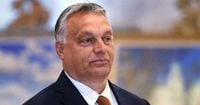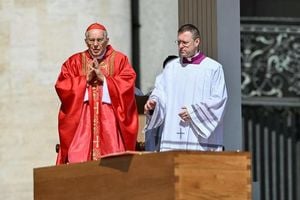Hungarian Prime Minister Viktor Orbán has made headlines once again, this time through a radio appearance on Kossuth Radio, where he discussed a variety of pressing issues including Pope Francis’s legacy, Ukraine’s potential accession to the European Union (EU), and the ongoing national consultations regarding this matter. His remarks have sparked significant debate in Hungary, particularly as they come in the context of the VOKS 2025 referendum, which seeks to gauge public opinion on Ukraine's EU membership.
Orbán described Pope Francis as a "man of peace, gentle, and unwaveringly courageous," emphasizing the importance of his pro-peace stance during a time of conflict. He noted that in the three years leading up to Donald Trump’s victory, Hungary and the Vatican were the only two countries in the Western world consistently advocating for peace. Orbán stated, "When you are alone, and we have always been alone in the European Council, the importance of every friendship and every sign of support grows," highlighting the significance of the Pope's support for Hungary.
Turning to the topic of Ukraine, Orbán expressed strong reservations about the country’s accession to the EU. He articulated that new members are usually accepted into the bloc because it benefits existing members. He remarked, "If we were to accept Ukraine and it would be good for us, then I would gladly say yes," but he firmly believes that this is not the case. Orbán warned that a free influx of Ukrainian workers could jeopardize the hard-won full employment in Hungary, stating, "It would be up to individuals to protect their own jobs; thus, the greatest achievement of the past 15 years, full employment, could vanish into thin air in a year or two."
Furthermore, Orbán contended that Ukraine's EU accession would drastically alter the financial landscape of the European agricultural economy, leaving Hungarian farmers in dire straits. He stated, "If Ukraine were to join, there would be no money for Hungarian farmers, putting hundreds of thousands of families in a very difficult situation." His comments reflect deep-seated concerns about the economic implications of Ukraine's potential membership.
In light of the Russian-Ukrainian conflict, Orbán suggested that peace is paramount and criticized the ongoing militarization in Europe. He noted, "Without the United States, Ukraine has no chance of maintaining its current position," and urged for an end to what he termed the "war psychosis" in Europe. He further criticized the Hungarian opposition in Brussels, claiming they want Hungary to contribute billions to the war effort, calling it a "hopeless, a leadership mistake, an unviable idea."
In a related vein, Orbán has called on Hungarian citizens to vote against Ukraine's EU accession in the VOKS 2025 referendum, which began on April 15 and will continue until the end of May. The government has framed the referendum as a way for citizens to express their views on this critical issue. He stated on social media, "Ukraine's accession to the EU jeopardizes everything we have achieved so far. We will not let them step over the Hungarians!" This statement encapsulates his position that the potential accession poses a threat to Hungarian sovereignty and achievements.
Orbán also expressed concerns about the alleged agreement between the opposition Tisza Party and Manfred Weber, leader of the European People’s Party, suggesting that this would lead to a suspension of EU funds to Hungary. He fears this would result in a loss of child protection and a migrant-free Hungary. He stated, "This would mean no more migrant-free Hungary, because migrants will be allowed in; no more child protection in Hungary, because LGBTQ people will be given free rein; and no more peace-loving Hungary, because we will fall into line and support military action in Ukraine."
Addressing the issue of EU funds, Orbán criticized the withholding of funds from Hungary, stating that it has led to a deterioration in living standards. He pointed to Tisza Party MEP Kinga Kollár’s remarks that this withholding would bolster the opposition's chances in the upcoming 2026 elections. Orbán asserted, "There are a few dozen people in Brussels who are working to prevent the Hungarian people from achieving any of this. This is unacceptable." He emphasized that Hungary is entitled to EU funds, having already secured 13 billion euros, which have helped raise teachers’ salaries and improve public services.
In a broader context, Orbán's remarks come against the backdrop of a significant national debate about Hungary's role in the EU and its relationship with neighboring Ukraine. While his government promotes a narrative of protecting Hungarian interests, opposition voices argue that there is a growing support for Ukraine's EU membership among the Hungarian populace. A survey organized by the Tisza Party indicated that over 58% of participants supported Ukraine's European integration, contrasting sharply with Orbán's position.
As the VOKS 2025 referendum unfolds, the tension between the government and opposition regarding Ukraine's EU accession is likely to intensify. Orbán's administration continues to frame the issue as one of national sovereignty and economic stability, while opponents argue for a more open and integrated European approach. The next few weeks will be crucial in determining how this debate shapes Hungary's future within the EU and its relationship with Ukraine.
In summary, Viktor Orbán's recent statements highlight the complexities surrounding Hungary's stance on Ukraine's EU accession. As the nation prepares for the VOKS 2025 referendum, the Prime Minister's strong rhetoric underscores the deep divisions within Hungarian politics regarding this pivotal issue.




